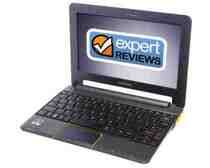Toshiba AC100-10z review
Despite appearances, the ultra-thin AC100 isn't a typical netbook for two reasons. First, Toshiba has opted to use Android, an operating system usually found on mobile phones, rather than Windows. And second, it’s powered by Nvidia's Tegra platform, usually used in tablets and other mobile devices.
Although a Windows-based operating system would struggle with Tegra’s 1GHz processor, 512MB of memory and 8GB of flash storage, it's a perfect match for Android. There's a meagre 6GB of usable storage once the operating system has been installed, however, so although it’s fine for web browsing, it’s rather limited as a media player.
It’s by using these low-power components, that Toshiba has made the AC100 so diminutive. It measures less than 20mm thick at its fattest point, and weighs less than 1kg even with the battery installed. Construction feels solid, but the striking black and orange colour scheme won’t be to everyone’s tastes.

The 10.1in screen was surprisingly good quality, with vibrant colours and wide viewing angles. The 1,024x600 resolution is much higher than the mobile phone screens Android was designed for, so Toshiba has had to change the interface significantly. Although it still looks very similar to regular Android devices, the application launcher is unique to the AC100. Unfortunately, this change prevents you from accessing the official Android store to download more programs. While Toshiba does provide an alternative, the selection of applications is limited. It’s possible to install programs from an SD card or USB memory stick, but the process is laborious.
With five separate desktops to fill with shortcuts and widgets, there are plenty of options for customisation. The AC100 can also set different home screens based on the wireless network it connects to, so you don’t have to re-arrange your icons between home and the office. Despite the widescreen display, widgets can’t be centrally aligned.
The software suite Toshiba installs on the AC100 has some useful applications, particularly the Opera web browser and EverNote for word processing, but others are limited to trial versions. The Documents To Go office suite in particular is especially frustrating, as you can’t create new documents without purchasing the full version.
Although it has a keyboard and touchpad like a regular laptop, we still found ourselves wanting to use the AC100 as a touchscreen because of the large icons and screen text. The keyboard itself uses mostly full-size keys, and while feedback was good, typing still felt cramped. The touchpad was responsive, but again the software is a stumbling block. In the majority of applications, scrolling acts like it does on a touchscreen (drag up to scroll down), rather than the opposite way we’re used to on a PC. Frustratingly, some third party applications used normal vertical scrolling, which made it difficult to adjust to one particular method. Navigating with the arrow keys was also awkward, as rather than scroll the page it would highlight each hyperlink in turn.
There were several other annoying quirks that will stand out for anyone used to Windows. The Return key moves forward through menus, but backspace doesn’t do the opposite; you have to reach over and hit escape. The tab key doesn’t switch between text fields, and even though the trackpad is perfectly suited for click and drag, moving desktop icons and widgets requires a prolonged press, as it would do on a phone.
